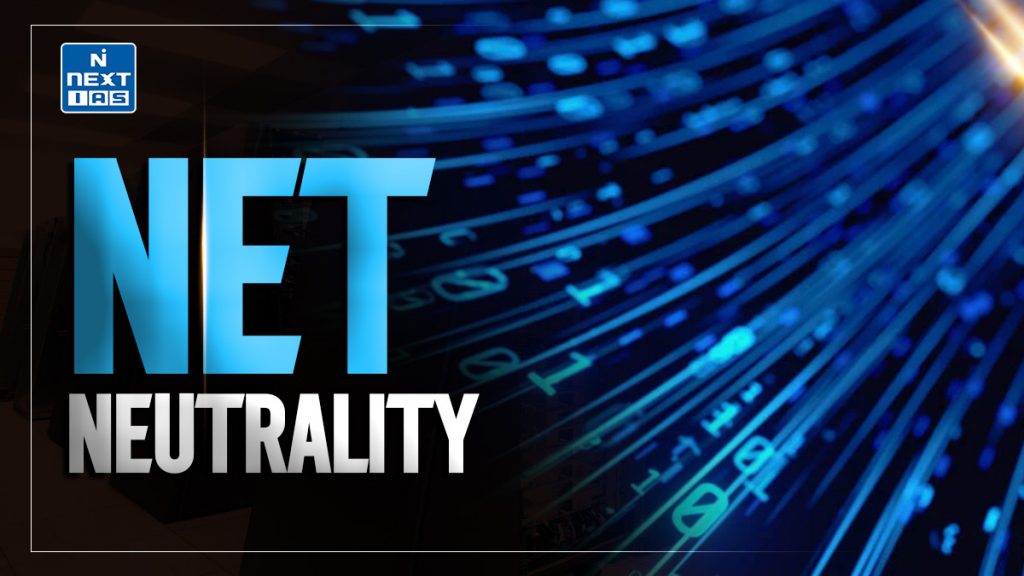
Net neutrality is the principle ensuring equal access to all internet content and services without discrimination by Internet Service Providers (ISPs). It promotes a free, open, and fair internet by preventing ISPs from prioritizing, throttling, or blocking specific content. This concept is vital for fostering innovation, competition, and digital rights.
What is Net Neutrality?
- It refers to the principle of treating all internet traffic equally, without discrimination by intermediary networks based on any criteria. Networks should remain neutral to the data they transmit, ensuring equal treatment regardless of content, application, service, device, sender, or recipient.
- This principle ensures that access to information and services on the internet is fair and unbiased, regardless of financial capability or the scale of the websites being accessed. The term “net neutrality” was introduced by Columbia Law School professor Tim Wu in his 2003 paper, Network Neutrality, Broadband Discrimination.
Key Principles of Net Neutrality
- Equal Treatment of Data: All internet traffic should be treated equally, regardless of content, platform, application, or user.
- No Blocking: Internet Service Providers (ISPs) must not block access to legal content, services, or applications.
- No Throttling: ISPs cannot intentionally slow down or degrade the performance of specific websites or applications.
- No Paid Prioritization: ISPs are prohibited from creating “fast lanes” for those who can pay more, ensuring fair access for all users and services.
- Transparency: ISPs must disclose their network management practices, performance, and terms of service to users.
- Non-Discrimination: ISPs cannot favor specific websites, services, or devices over others.
These principles collectively promote an open, competitive, and user-focused internet ecosystem.
Stakeholders Impacted by Net Neutrality
- Consumers:
- Benefit from unrestricted access to content and services without additional costs or degraded performance.
- Any violation of net neutrality can limit their online choices or increase costs.
- Content Providers (e.g., websites, streaming services):
- Depend on equal treatment of data to reach users without extra charges or prioritization issues.
- Smaller players may struggle to compete if ISPs implement paid prioritization.
- Internet Service Providers (ISPs):
- Often oppose strict net neutrality regulations, seeking flexibility to manage traffic or charge for premium services.
- Must ensure network management complies with neutrality rules.
- Governments and Regulators:
- Responsible for establishing and enforcing net neutrality policies to balance innovation, competition, and consumer protection.
- Startups and Small Businesses:
- Rely on an open internet to compete with larger, well-established companies without facing barriers like throttling or extra fees.
- Advocacy Groups and Civil Societies:
- Actively campaign for net neutrality to protect freedom of expression, innovation, and equal internet access.
- Technology Companies (e.g., hardware, software providers):
- Their services and devices depend on a neutral internet for optimal performance and user adoption.
- Academic and Research Institutions:
- Require fair and equal internet access for collaboration, innovation, and sharing knowledge globally.
It affects the entire internet ecosystem, shaping access, innovation, and user experience for all stakeholders.
Why does Net Neutrality Matter?
- Promotes Fair Access:
- Ensures everyone has equal access to information and services online, regardless of their financial or social standing.
- Encourages Innovation:
- Provides a level playing field for startups and smaller businesses, enabling them to compete with larger, established companies without needing to pay for prioritization.
- Protects Free Speech:
- Prevents ISPs from blocking or throttling content, safeguarding the freedom of expression and access to diverse viewpoints.
- Fosters Competition:
- Eliminates unfair advantages for larger companies, encouraging competition and benefiting consumers with more choices and better services.
- Prevents Corporate Abuse:
- Stops ISPs from exploiting their control over internet traffic to prioritize their own services or charge exorbitant fees for faster access.
- Ensures Consumer Choice:
- Allows users to access the content and services they prefer without interference or bias from ISPs.
- Drives Economic Growth:
- An open and neutral internet spurs innovation, entrepreneurship, and investment, contributing to economic development.
It is essential for maintaining the internet as a free, open, and equitable platform for communication, innovation, and economic progress.
Regulatory Status of Net Neutrality in India
India has adopted strong net neutrality regulations to ensure equal and open internet access for all users:
- Telecom Regulatory Authority of India (TRAI) Guidelines:
- In 2018, TRAI issued recommendations prohibiting discriminatory treatment of internet traffic.
- It barred practices like throttling, blocking, and paid prioritization by Internet Service Providers (ISPs).
- Department of Telecommunications (DoT) Approval:
- The DoT accepted TRAI’s recommendations and amended licensing agreements to include net neutrality clauses.
- ISPs are now legally required to adhere to net neutrality principles.
- Prohibition of Zero-Rating Services:
- Zero-rating services, where ISPs offer free access to select apps or websites while charging for others, are prohibited.
- This ensures fair competition and prevents large platforms from dominating.
- Exceptions for Critical Services:
- The regulations allow exceptions for specialized services, such as emergency healthcare or remote surgery, where prioritization is necessary for public welfare.
India’s strong stance on net neutrality ensures an open and equitable internet while balancing technological advancements and public interest.
Way Forward
The way forward for it involves ensuring that the internet remains an open platform where all data is treated equally. Key steps include:
- Legislation: Governments must enact clear and strong laws protecting net neutrality to prevent internet service providers (ISPs) from throttling, blocking, or prioritizing certain content for financial gain.
- Public Awareness: Increased awareness and advocacy around net neutrality can rally support for policies that prevent unfair practices and ensure equitable access to online services.
- Global Cooperation: As the internet is a global network, international cooperation is essential. Global agreements on net neutrality can help standardize regulations and prevent fragmented policies that could hinder global access.
- Technology & Innovation: Encouraging innovation in both infrastructure and policy solutions can foster a competitive landscape where ISPs can offer quality service without compromising fairness.
In sum, protecting net neutrality requires a combination of legal frameworks, public advocacy, and technological advancements to maintain an open and equal internet.
Conclusion
It ensures equal access to the internet, preventing service providers from prioritizing certain content or blocking others. It is vital for maintaining a free and open internet, fostering innovation, protecting consumers, and preserving online freedom. Upholding net neutrality supports fairness and prevents monopolistic control over internet services.
Frequently Asked Questions (FAQs)
Who benefits from net neutrality?
It benefits consumers, startups, and small businesses by ensuring equal access to online content and services. It prevents internet service providers from prioritizing certain websites or services, fostering a fair and competitive online environment that encourages innovation and protects freedom of expression.
What are examples of net neutrality?
Examples of net neutrality include preventing ISPs from blocking access to legal content, throttling internet speeds for certain services, or offering paid “fast lanes” to prioritize certain websites. It ensures all online data is treated equally, allowing fair access to all users and businesses.
Which committee was appointed on the issue of net neutrality in India?
The Telecom Regulatory Authority of India (TRAI) appointed the Committee on Net Neutrality in 2015. This committee was tasked with reviewing the issues surrounding net neutrality and providing recommendations on whether discriminatory practices by Internet Service Providers should be allowed in India.
What is the current status of net neutrality?
As of now, it is upheld in India. The Telecom Regulatory Authority of India (TRAI) issued guidelines in 2018 prohibiting internet service providers from blocking, throttling, or prioritizing content. The government continues to support a free and open internet for all users.
Who invented net neutrality?
It was popularized by Tim Wu, a professor at Columbia Law School, in 2003. He coined the term to describe the principle of treating all internet data equally, advocating for an open, non-discriminatory internet without content restrictions.






